- Home
- Jim Eldridge
Murder at the Ashmolean Page 2
Murder at the Ashmolean Read online
Page 2
Marriott frowned thoughtfully, then shook his head.
‘No one in particular,’ he said at last. ‘Now I come to think of it, in spite of the fact that he was always cheerful and friendly to everyone, full of bonhomie, I can’t think of anyone here that he spent time with outside the museum. It might be worth talking to Hugh Thomas, the man who brought you up to my office. He’s our chief steward and he knows most of what goes on with the staff, certainly better than I do. I leave that sort of thing to him while I concentrate on the administrative side.’
CHAPTER TWO
After their meeting with Gladstone Marriott, Daniel and Abigail left the museum and made for a coffee house not far from there, where they could discuss the case away from the very concerned looks of Gladstone Marriott.
‘What do you think?’ asked Daniel as he spooned sugar into his coffee. ‘About this Shakespeare play?’
‘Absolute nonsense,’ said Abigail. ‘If anyone really did have anything of Shakespeare’s, and in his own hand, they’d take it to the Bodleian, not the Ashmolean.’
‘Who or what is the Bodleian?’ asked Daniel.
She stared at him.
‘Surely you’ve heard of Oxford’s famous Bodleian Library?’
‘No,’ he said. ‘As I said on the train, this is my first visit to Oxford, and I know as little about it as I did Cambridge the first time I went there. Except that Oxford is the oldest university in the world.’
‘Second oldest,’ Abigail corrected him.
‘You mean Cambridge is the oldest?’
‘Cambridge is the second oldest in Britain and fourth oldest in the world. The world’s oldest university is Bologna in Italy.’
This time it was Daniel’s turn to stare.
‘How do you know these things?’ he asked.
‘Because it’s what university graduates do, find out about other universities and exchange information. All it means is you and I each have different areas of knowledge. For example, I wouldn’t know how to pick a lock, or understand any of the language most common criminals use, all of which you are very well versed in.’
‘Can we get back to the Bodleian,’ said Daniel. ‘Why would this mysterious person have offered it to them instead of the Ashmolean?’
‘Because the Bodleian is one of the oldest and most respected libraries in the world. It was accumulating books before printing was invented. It already holds copies of Shakespeare’s works. Whereas the Ashmolean is mainly about artefacts: sculptures, pottery, articles of clothing. So, which one would be the natural choice to take this alleged Shakespeare to?’
‘Unless it was too obviously a forgery,’ mused Daniel.
‘Exactly,’ said Abigail. ‘Someone is always claiming they’ve discovered a supposedly lost play or poem of Shakespeare, or other writers such as Chaucer. It’s quite an industry among the literary criminal fraternity. The documents – if they exist – are nearly always faked, and often badly. It will be interesting to actually lay eyes on this alleged Shakespeare and see what standard of forgery it is.’
‘You’re convinced it’s a fake?’
‘If it exists at all,’ said Abigail. ‘So, what’s our next move? Talk to Hugh Thomas and see if he can give us any information about who Everett socialised with?’
‘I think my next move is to pay a call on this Inspector Pitt,’ said Daniel.
‘Without me?’
Daniel smiled. ‘You must have learnt by now that most police forces are notoriously unhappy about private enquiry agents being involved in their area, and they are even more suspicious of women detectives. If not downright hostile. This Inspector Pitt may be the same, in which case I shall be evicted from the police station, but there’s no need for us both to suffer that indignity. If I find that, on the contrary, Inspector Pitt is welcoming then my visit will break the ice for both of us.’
‘You’re being overprotective,’ sniffed Abigail disapprovingly.
‘I can’t see the point of you suffering sarcastic comments and being ejected from a building, if that’s how it might turn out,’ said Daniel. ‘Life’s hard enough without creating unnecessary troubles.’
She smiled. ‘Very well. But I shall be making the acquaintance of this Inspector Pitt at some time or other.’
‘I know you will,’ he said. ‘I’m just trying to make things easier. What will you do? Go to the hotel?’
‘Good heavens, no! I shall go back to the Ashmolean and avail myself of the opportunity to immerse myself in the museum’s wonders. For example, have you ever seen the Alfred Jewel?’ She shook her head. ‘No, that’s a silly question as you haven’t been to Oxford before.’
‘The Alfred Jewel?’ he asked.
‘An ornate piece of jewellery made for Alfred the Great. It’s quite superb, and it’s been one of the Ashmolean’s greatest prizes for two hundred years. So, while you’re having an awkward confrontation with this Inspector Pitt, I shall be rejoicing in the Ashmolean’s treasures.’
‘Yes, that was another thing that came up during our conversation with Mr Marriott,’ said Daniel, puzzled. ‘What was that business about not being able to take the matter to the keeper of the Ashmolean? The “current circumstances” he talked about.’
‘The keeper of the Ashmolean is Arthur Evans, a very distinguished archaeologist,’ explained Abigail. ‘He was appointed in 1884 and he’s done a superb job. Before him the Ashmolean was in a bit of a parlous state; artefacts had been loaned out to other museums, the upper floor was being used for social functions, but Evans reversed all that, brought the artefacts back, instigated a proper collections policy, and returned its academic credibility. Sadly, a couple of years ago, he suffered two terrible tragedies. First his father-in-law, Edward Freeman, died. Freeman was more than just his father-in-law, he was his mentor in so many ways. And then a year later, Evans’ wife, Margaret, Freeman’s eldest daughter, also died while the couple were in Greece.
‘Since that, Evans has stayed abroad, immersing himself in archaeological digs. He’s rarely seen in Oxford any longer, leaving the running of the museum to people like Gladstone Marriott.’
‘So, one tragedy after another,’ mused Daniel. ‘All fatal, and all connected to the Ashmolean. Let’s hope that’s not an omen for us.’
‘The deaths of Edward Freeman and Margaret Evans were from natural causes,’ Abigail pointed out.
‘But not that of Gavin Everett,’ said Daniel. ‘Let’s hope we don’t encounter more deaths before this case is over.’
CHAPTER THREE
Abigail stood before the glass case that housed the Alfred Jewel, rapt. She’d seen the jewel before, but she never failed to feel excited by items such as this, real objects that stretched back in time and gave a solid connection between then and now. It was one of the reasons she’d become an archaeologist, to be able to hold in her hands things that had been wrought hundreds of years before. Or, in her case, with Egyptian, Roman and Greek antiquities being her speciality, many thousands of years. The Alfred Jewel was almost modern when compared to those ancient treasures, having been made, it was believed, in the late ninth century, but that was still a thousand years ago, and the piece itself was exquisite: the image of a man – assumed to be Jesus Christ – made of painted enamel, with the green of his clothes predominant, surrounded by a gold circle, on which the engraved words ‘Aelfred mec heht gewyrcan’ were clear, Old English for ‘Alfred ordered me made’. It had been dug up in 1693 on land in Somerset, Alfred’s old Kingdom of Wessex, and the restoration that had taken place filled Abigail with admiration, to restore something to such original beauty after it had lain for many hundreds of years in soil showed a very special talent.
‘Miss Fenton? Abigail Fenton?’
Abigail, jolted out of her reverie over the jewel, turned and saw a young blonde woman smiling, albeit slightly apprehensively, at her. The young woman held out her hand. ‘Esther Maris. I’m a reporter for the Oxford Messenger.’
‘A woman reporter,’ commented Abigail app
rovingly, shaking the young woman’s hand. ‘The Oxford Messenger is to be congratulated on its progressiveness.’
‘I heard that you and Mr Daniel Wilson are here to investigate Mr Everett’s death.’
‘We’ve been asked to look into the circumstances,’ replied Abigail guardedly. ‘But at the moment we don’t have anything that’s for publication. We’ve only just arrived.’
‘That doesn’t matter,’ said Esther. ‘I wonder if it would be possible to have an interview with you.’
‘I’m afraid Mr Wilson isn’t here at the moment.’
‘No, I meant an interview with you.’
‘Me?’ said Abigail, surprised.
Esther’s expression took on an apologetic look.
‘When I said I was a reporter, the truth is I’m trying to be one. At the moment they’ve given me the women’s page.’
‘That’s still a step forward from most newspapers,’ said Abigail. ‘Mostly, women tend to be avoided in their pages unless they’re celebrities, murderesses, or political agitators.’
Esther gave an awkward grimace. ‘Yes, and to be honest I only really got this job because my uncle is the proprietor of the newspaper and he persuaded the editor to employ me, and the editor has restricted me to what he calls “women’s issues”. But I intend to prove to him that I can be a proper journalist, so I’m using my column to expand what most people think of as “women’s issues”. For example, you. A woman detective!’
‘I’m not sure if it’s accurate to describe me as a detective,’ said Abigail doubtfully. ‘I work with Mr Wilson, who is a former detective with Scotland Yard, and I’m learning from him. So, I suppose you could call me a trainee.’
‘In the same way that you could call me a trainee journalist,’ said Esther enthusiastically. ‘Please, my readers would love to hear about you. Can we talk? I promise I’ll let you see what I write before I put my copy in.’
‘Very well,’ said Abigail. She looked towards an attendant, who was glaring at the two women with an expression of disapproval. ‘But somewhere else. I don’t think the Ashmolean would approve of us disturbing the rather reverential air here with a stream of chatter.’
‘Why don’t we go to the Randolph Hotel across the road,’ suggested Esther. ‘They do a lovely afternoon tea there. And the Oxford Messenger will foot the bill.’
Daniel had made his way to Oxford’s central police station at Kemp Hall, an ancient timbered building from days long gone by, possibly Elizabethan to Daniel’s eye. It was set in a yard just to the south of the high street. He was told that Inspector Pitt was on site and was escorted by a uniformed constable to a small office at the back of the police station, where Inspector Pitt was sitting at his desk, studying some papers. Pitt looked up unsmiling and wary at Daniel as he entered the office.
‘Good afternoon, Inspector. My name’s Daniel Wilson and I’m a private enquiry agent. Out of courtesy, I’ve come to let you know that Miss Abigail Fenton and I have been asked by the Ashmolean to look into the events surrounding the death of Mr Everett there.’
‘It’s suicide,’ said Pitt curtly.
‘I know,’ said Daniel. ‘We’ve been asked to look into why he may have committed suicide, in case there might be any adverse reflection on the Ashmolean.’
The inspector studied Daniel thoughtfully for a moment, then he said, ‘You were one of Abberline’s crew.’
‘I was,’ said Daniel. ‘But that was some time ago. I left the force shortly after he did.’
‘Your name came up when I was talking to one of your old colleagues recently. John Feather of the Met.’
Daniel’s face broke into a smile.
‘John! How is he? I haven’t seen him …’
‘Since that business at the British Museum,’ finished Pitt. ‘Yes, he told me about that. And how you never got the credit for cracking the case. You and your partner, this Miss Fenton.’
‘Credit would be nice, but that’s not why we do it,’ said Daniel. ‘John’s a great detective, and an even better person.’
‘Yes, he said the same about you,’ said Pitt. He cast a look around to make sure they weren’t being overheard, then got to his feet and said in almost a whisper, ‘That’s why I’m going to tell you something.’ He jerked his head towards the door. ‘Let’s go out the back. Less chance of wagging ears.’
Intrigued, Daniel followed the inspector out of his office, down a corridor, and then through a door and into a cobbled courtyard that smelt strongly of horse manure.
‘The stables,’ said Pitt.
Daniel smiled and gave a sniff. ‘Yes. I picked up the clue.’
A row of four half-doors ran along one side of the yard. All were shut, so Daniel assumed the horses were out.
‘This Everett business,’ said Pitt. ‘I didn’t like it, and I said so to my guv’nor, Superintendent Clare. For one thing there were no powder marks around the wound, and if the pistol had been fired with the end against his forehead, you’d have expected powder marks at least.’
‘So, the indication was that the shot came from a longer distance.’
‘That was my thinking.’
‘And the business of the door being locked?’
‘Did you examine the door?’
‘Yes. There was space at the bottom for a key to be pushed under it.’
‘Exactly. The way I see it, someone aims a pistol at Everett and shoots him in the forehead, then drops the pistol by his hand. They go out, lock the door from the outside, then push the key under the door back into the room so that when the door’s opened it looks as if the key fell out of the lock.’
‘How did your super react when you told him this?’
‘At first he was all for starting an investigation. And then the telegram arrived. “No investigation into Everett death. Suicide.” The super showed it to me, but with strict instructions not to say anything to anyone else. I’m only telling you based on what John Feather told me about you, and to warn you that if you carry on with this you’ll be moving into dangerous territory.’
‘Who was the telegram from?’
‘The War Office.’
Daniel frowned. ‘The War Office? What would they have to do with an executive of a museum in Oxford?’
‘It suggests to me he was more than just that.’
‘Was he ever involved with the military? In the armed forces, for example?’
‘Not that we could discover.’
‘Did Superintendent Clare question the instructions in the telegram?’
Pitt shook his head. ‘The super’s a good bloke, but like all supers I’ve ever known, he doesn’t like to upset the powers that be. So, officially, that’s it. But remember what I said: I haven’t said anything to you about the case, and especially not about the telegram.’ He saw the look of doubt darken Daniel’s face, and asked, ‘Is that a problem?’
‘No,’ said Daniel hesitantly, ‘but I don’t feel comfortable about keeping that from Gladstone Marriott at the Ashmolean. They’re the ones paying us, and we’re supposed to keep him informed. And, of course, there’s my partner, Miss Fenton.’
Pitt deliberated on this for a brief moment, then nodded.
‘Understood,’ he said. ‘Your partner, yes. But as far as the Ashmolean is concerned, can I ask you to only keep it to Marriott? And to persuade him to keep this to himself. If it gets out, the super will know it came from me, and he’s a good bloke. I don’t want him to feel I’ve let him down.’
‘Trust me,’ Daniel promised him. ‘Miss Fenton and Mr Marriott, and no further. And I’ll impress on Marriott the need to keep it to himself, and no one else.’
Abigail and Esther sat in the elegant tea room in the opulent surroundings of the Randolph Hotel. Abigail had been here before when visiting a friend in Oxford. It seemed to her that the Randolph was where people brought other people to impress them. Was that the case here with Esther Maris? If so, Abigail had been tempted to tell the young woman it wasn’t necessary; for
Abigail it was people who impressed her, or didn’t, not their surroundings. But she had to admit, the pastries they served at the Randolph were particularly good.
‘I’ve been doing some research into you and Mr Wilson, and I learnt that you used to be an archaeologist before you became a detective,’ said Esther.
‘I still am an archaeologist,’ said Abigail. ‘Mr Wilson brings me into the detective work when there might be a historical aspect.’
‘I found some articles you wrote about your work in Egypt, unearthing ancient relics at the site of the pyramids. How hard was that for you as a woman? Mostly it seems that sort of archaeology is done by men.’
‘In fact, there are quite a few women archaeologists, but most prominence is given to men because they tend to lead the expeditions. I suppose I’m unusual in that I also write articles about the digs, and in that aspect, I’ve been fortunate in the fact that the men who led the expeditions and digs I’ve been on encouraged me to do that.’
‘You were involved in digs in Egypt and Mesopotamia, and Greece and Turkey. Were there any problems for you as a woman while you were there?’
‘No, I was accepted by the locals as a person doing a job. Don’t forget, there have been many other women doing such work before me. Hester Stanhope, for example, who in the last century was the first to carry out an archaeological dig in the Holy Land.’
‘You got your degree in history at Cambridge, didn’t you? At Girton?’
‘You have been doing your homework,’ Abigail complimented her.
‘Again, that’s unusual for a woman.’
‘Not that unusual,’ said Abigail. ‘Here at Oxford you have Somerville College, which is a women’s college. I accept these may be early days in society accepting that women deserve an equal education to men, but Girton and Somerville are just the start.’
‘But has your success been at the expense of romance?’
‘What do you mean?’ asked Abigail, warily.
‘Most women expect to fall in love and marry and have children—’
‘No one in particular,’ he said at last. ‘Now I come to think of it, in spite of the fact that he was always cheerful and friendly to everyone, full of bonhomie, I can’t think of anyone here that he spent time with outside the museum. It might be worth talking to Hugh Thomas, the man who brought you up to my office. He’s our chief steward and he knows most of what goes on with the staff, certainly better than I do. I leave that sort of thing to him while I concentrate on the administrative side.’
CHAPTER TWO
After their meeting with Gladstone Marriott, Daniel and Abigail left the museum and made for a coffee house not far from there, where they could discuss the case away from the very concerned looks of Gladstone Marriott.
‘What do you think?’ asked Daniel as he spooned sugar into his coffee. ‘About this Shakespeare play?’
‘Absolute nonsense,’ said Abigail. ‘If anyone really did have anything of Shakespeare’s, and in his own hand, they’d take it to the Bodleian, not the Ashmolean.’
‘Who or what is the Bodleian?’ asked Daniel.
She stared at him.
‘Surely you’ve heard of Oxford’s famous Bodleian Library?’
‘No,’ he said. ‘As I said on the train, this is my first visit to Oxford, and I know as little about it as I did Cambridge the first time I went there. Except that Oxford is the oldest university in the world.’
‘Second oldest,’ Abigail corrected him.
‘You mean Cambridge is the oldest?’
‘Cambridge is the second oldest in Britain and fourth oldest in the world. The world’s oldest university is Bologna in Italy.’
This time it was Daniel’s turn to stare.
‘How do you know these things?’ he asked.
‘Because it’s what university graduates do, find out about other universities and exchange information. All it means is you and I each have different areas of knowledge. For example, I wouldn’t know how to pick a lock, or understand any of the language most common criminals use, all of which you are very well versed in.’
‘Can we get back to the Bodleian,’ said Daniel. ‘Why would this mysterious person have offered it to them instead of the Ashmolean?’
‘Because the Bodleian is one of the oldest and most respected libraries in the world. It was accumulating books before printing was invented. It already holds copies of Shakespeare’s works. Whereas the Ashmolean is mainly about artefacts: sculptures, pottery, articles of clothing. So, which one would be the natural choice to take this alleged Shakespeare to?’
‘Unless it was too obviously a forgery,’ mused Daniel.
‘Exactly,’ said Abigail. ‘Someone is always claiming they’ve discovered a supposedly lost play or poem of Shakespeare, or other writers such as Chaucer. It’s quite an industry among the literary criminal fraternity. The documents – if they exist – are nearly always faked, and often badly. It will be interesting to actually lay eyes on this alleged Shakespeare and see what standard of forgery it is.’
‘You’re convinced it’s a fake?’
‘If it exists at all,’ said Abigail. ‘So, what’s our next move? Talk to Hugh Thomas and see if he can give us any information about who Everett socialised with?’
‘I think my next move is to pay a call on this Inspector Pitt,’ said Daniel.
‘Without me?’
Daniel smiled. ‘You must have learnt by now that most police forces are notoriously unhappy about private enquiry agents being involved in their area, and they are even more suspicious of women detectives. If not downright hostile. This Inspector Pitt may be the same, in which case I shall be evicted from the police station, but there’s no need for us both to suffer that indignity. If I find that, on the contrary, Inspector Pitt is welcoming then my visit will break the ice for both of us.’
‘You’re being overprotective,’ sniffed Abigail disapprovingly.
‘I can’t see the point of you suffering sarcastic comments and being ejected from a building, if that’s how it might turn out,’ said Daniel. ‘Life’s hard enough without creating unnecessary troubles.’
She smiled. ‘Very well. But I shall be making the acquaintance of this Inspector Pitt at some time or other.’
‘I know you will,’ he said. ‘I’m just trying to make things easier. What will you do? Go to the hotel?’
‘Good heavens, no! I shall go back to the Ashmolean and avail myself of the opportunity to immerse myself in the museum’s wonders. For example, have you ever seen the Alfred Jewel?’ She shook her head. ‘No, that’s a silly question as you haven’t been to Oxford before.’
‘The Alfred Jewel?’ he asked.
‘An ornate piece of jewellery made for Alfred the Great. It’s quite superb, and it’s been one of the Ashmolean’s greatest prizes for two hundred years. So, while you’re having an awkward confrontation with this Inspector Pitt, I shall be rejoicing in the Ashmolean’s treasures.’
‘Yes, that was another thing that came up during our conversation with Mr Marriott,’ said Daniel, puzzled. ‘What was that business about not being able to take the matter to the keeper of the Ashmolean? The “current circumstances” he talked about.’
‘The keeper of the Ashmolean is Arthur Evans, a very distinguished archaeologist,’ explained Abigail. ‘He was appointed in 1884 and he’s done a superb job. Before him the Ashmolean was in a bit of a parlous state; artefacts had been loaned out to other museums, the upper floor was being used for social functions, but Evans reversed all that, brought the artefacts back, instigated a proper collections policy, and returned its academic credibility. Sadly, a couple of years ago, he suffered two terrible tragedies. First his father-in-law, Edward Freeman, died. Freeman was more than just his father-in-law, he was his mentor in so many ways. And then a year later, Evans’ wife, Margaret, Freeman’s eldest daughter, also died while the couple were in Greece.
‘Since that, Evans has stayed abroad, immersing himself in archaeological digs. He’s rarely seen in Oxford any longer, leaving the running of the museum to people like Gladstone Marriott.’
‘So, one tragedy after another,’ mused Daniel. ‘All fatal, and all connected to the Ashmolean. Let’s hope that’s not an omen for us.’
‘The deaths of Edward Freeman and Margaret Evans were from natural causes,’ Abigail pointed out.
‘But not that of Gavin Everett,’ said Daniel. ‘Let’s hope we don’t encounter more deaths before this case is over.’
CHAPTER THREE
Abigail stood before the glass case that housed the Alfred Jewel, rapt. She’d seen the jewel before, but she never failed to feel excited by items such as this, real objects that stretched back in time and gave a solid connection between then and now. It was one of the reasons she’d become an archaeologist, to be able to hold in her hands things that had been wrought hundreds of years before. Or, in her case, with Egyptian, Roman and Greek antiquities being her speciality, many thousands of years. The Alfred Jewel was almost modern when compared to those ancient treasures, having been made, it was believed, in the late ninth century, but that was still a thousand years ago, and the piece itself was exquisite: the image of a man – assumed to be Jesus Christ – made of painted enamel, with the green of his clothes predominant, surrounded by a gold circle, on which the engraved words ‘Aelfred mec heht gewyrcan’ were clear, Old English for ‘Alfred ordered me made’. It had been dug up in 1693 on land in Somerset, Alfred’s old Kingdom of Wessex, and the restoration that had taken place filled Abigail with admiration, to restore something to such original beauty after it had lain for many hundreds of years in soil showed a very special talent.
‘Miss Fenton? Abigail Fenton?’
Abigail, jolted out of her reverie over the jewel, turned and saw a young blonde woman smiling, albeit slightly apprehensively, at her. The young woman held out her hand. ‘Esther Maris. I’m a reporter for the Oxford Messenger.’
‘A woman reporter,’ commented Abigail app
rovingly, shaking the young woman’s hand. ‘The Oxford Messenger is to be congratulated on its progressiveness.’
‘I heard that you and Mr Daniel Wilson are here to investigate Mr Everett’s death.’
‘We’ve been asked to look into the circumstances,’ replied Abigail guardedly. ‘But at the moment we don’t have anything that’s for publication. We’ve only just arrived.’
‘That doesn’t matter,’ said Esther. ‘I wonder if it would be possible to have an interview with you.’
‘I’m afraid Mr Wilson isn’t here at the moment.’
‘No, I meant an interview with you.’
‘Me?’ said Abigail, surprised.
Esther’s expression took on an apologetic look.
‘When I said I was a reporter, the truth is I’m trying to be one. At the moment they’ve given me the women’s page.’
‘That’s still a step forward from most newspapers,’ said Abigail. ‘Mostly, women tend to be avoided in their pages unless they’re celebrities, murderesses, or political agitators.’
Esther gave an awkward grimace. ‘Yes, and to be honest I only really got this job because my uncle is the proprietor of the newspaper and he persuaded the editor to employ me, and the editor has restricted me to what he calls “women’s issues”. But I intend to prove to him that I can be a proper journalist, so I’m using my column to expand what most people think of as “women’s issues”. For example, you. A woman detective!’
‘I’m not sure if it’s accurate to describe me as a detective,’ said Abigail doubtfully. ‘I work with Mr Wilson, who is a former detective with Scotland Yard, and I’m learning from him. So, I suppose you could call me a trainee.’
‘In the same way that you could call me a trainee journalist,’ said Esther enthusiastically. ‘Please, my readers would love to hear about you. Can we talk? I promise I’ll let you see what I write before I put my copy in.’
‘Very well,’ said Abigail. She looked towards an attendant, who was glaring at the two women with an expression of disapproval. ‘But somewhere else. I don’t think the Ashmolean would approve of us disturbing the rather reverential air here with a stream of chatter.’
‘Why don’t we go to the Randolph Hotel across the road,’ suggested Esther. ‘They do a lovely afternoon tea there. And the Oxford Messenger will foot the bill.’
Daniel had made his way to Oxford’s central police station at Kemp Hall, an ancient timbered building from days long gone by, possibly Elizabethan to Daniel’s eye. It was set in a yard just to the south of the high street. He was told that Inspector Pitt was on site and was escorted by a uniformed constable to a small office at the back of the police station, where Inspector Pitt was sitting at his desk, studying some papers. Pitt looked up unsmiling and wary at Daniel as he entered the office.
‘Good afternoon, Inspector. My name’s Daniel Wilson and I’m a private enquiry agent. Out of courtesy, I’ve come to let you know that Miss Abigail Fenton and I have been asked by the Ashmolean to look into the events surrounding the death of Mr Everett there.’
‘It’s suicide,’ said Pitt curtly.
‘I know,’ said Daniel. ‘We’ve been asked to look into why he may have committed suicide, in case there might be any adverse reflection on the Ashmolean.’
The inspector studied Daniel thoughtfully for a moment, then he said, ‘You were one of Abberline’s crew.’
‘I was,’ said Daniel. ‘But that was some time ago. I left the force shortly after he did.’
‘Your name came up when I was talking to one of your old colleagues recently. John Feather of the Met.’
Daniel’s face broke into a smile.
‘John! How is he? I haven’t seen him …’
‘Since that business at the British Museum,’ finished Pitt. ‘Yes, he told me about that. And how you never got the credit for cracking the case. You and your partner, this Miss Fenton.’
‘Credit would be nice, but that’s not why we do it,’ said Daniel. ‘John’s a great detective, and an even better person.’
‘Yes, he said the same about you,’ said Pitt. He cast a look around to make sure they weren’t being overheard, then got to his feet and said in almost a whisper, ‘That’s why I’m going to tell you something.’ He jerked his head towards the door. ‘Let’s go out the back. Less chance of wagging ears.’
Intrigued, Daniel followed the inspector out of his office, down a corridor, and then through a door and into a cobbled courtyard that smelt strongly of horse manure.
‘The stables,’ said Pitt.
Daniel smiled and gave a sniff. ‘Yes. I picked up the clue.’
A row of four half-doors ran along one side of the yard. All were shut, so Daniel assumed the horses were out.
‘This Everett business,’ said Pitt. ‘I didn’t like it, and I said so to my guv’nor, Superintendent Clare. For one thing there were no powder marks around the wound, and if the pistol had been fired with the end against his forehead, you’d have expected powder marks at least.’
‘So, the indication was that the shot came from a longer distance.’
‘That was my thinking.’
‘And the business of the door being locked?’
‘Did you examine the door?’
‘Yes. There was space at the bottom for a key to be pushed under it.’
‘Exactly. The way I see it, someone aims a pistol at Everett and shoots him in the forehead, then drops the pistol by his hand. They go out, lock the door from the outside, then push the key under the door back into the room so that when the door’s opened it looks as if the key fell out of the lock.’
‘How did your super react when you told him this?’
‘At first he was all for starting an investigation. And then the telegram arrived. “No investigation into Everett death. Suicide.” The super showed it to me, but with strict instructions not to say anything to anyone else. I’m only telling you based on what John Feather told me about you, and to warn you that if you carry on with this you’ll be moving into dangerous territory.’
‘Who was the telegram from?’
‘The War Office.’
Daniel frowned. ‘The War Office? What would they have to do with an executive of a museum in Oxford?’
‘It suggests to me he was more than just that.’
‘Was he ever involved with the military? In the armed forces, for example?’
‘Not that we could discover.’
‘Did Superintendent Clare question the instructions in the telegram?’
Pitt shook his head. ‘The super’s a good bloke, but like all supers I’ve ever known, he doesn’t like to upset the powers that be. So, officially, that’s it. But remember what I said: I haven’t said anything to you about the case, and especially not about the telegram.’ He saw the look of doubt darken Daniel’s face, and asked, ‘Is that a problem?’
‘No,’ said Daniel hesitantly, ‘but I don’t feel comfortable about keeping that from Gladstone Marriott at the Ashmolean. They’re the ones paying us, and we’re supposed to keep him informed. And, of course, there’s my partner, Miss Fenton.’
Pitt deliberated on this for a brief moment, then nodded.
‘Understood,’ he said. ‘Your partner, yes. But as far as the Ashmolean is concerned, can I ask you to only keep it to Marriott? And to persuade him to keep this to himself. If it gets out, the super will know it came from me, and he’s a good bloke. I don’t want him to feel I’ve let him down.’
‘Trust me,’ Daniel promised him. ‘Miss Fenton and Mr Marriott, and no further. And I’ll impress on Marriott the need to keep it to himself, and no one else.’
Abigail and Esther sat in the elegant tea room in the opulent surroundings of the Randolph Hotel. Abigail had been here before when visiting a friend in Oxford. It seemed to her that the Randolph was where people brought other people to impress them. Was that the case here with Esther Maris? If so, Abigail had been tempted to tell the young woman it wasn’t necessary; for
Abigail it was people who impressed her, or didn’t, not their surroundings. But she had to admit, the pastries they served at the Randolph were particularly good.
‘I’ve been doing some research into you and Mr Wilson, and I learnt that you used to be an archaeologist before you became a detective,’ said Esther.
‘I still am an archaeologist,’ said Abigail. ‘Mr Wilson brings me into the detective work when there might be a historical aspect.’
‘I found some articles you wrote about your work in Egypt, unearthing ancient relics at the site of the pyramids. How hard was that for you as a woman? Mostly it seems that sort of archaeology is done by men.’
‘In fact, there are quite a few women archaeologists, but most prominence is given to men because they tend to lead the expeditions. I suppose I’m unusual in that I also write articles about the digs, and in that aspect, I’ve been fortunate in the fact that the men who led the expeditions and digs I’ve been on encouraged me to do that.’
‘You were involved in digs in Egypt and Mesopotamia, and Greece and Turkey. Were there any problems for you as a woman while you were there?’
‘No, I was accepted by the locals as a person doing a job. Don’t forget, there have been many other women doing such work before me. Hester Stanhope, for example, who in the last century was the first to carry out an archaeological dig in the Holy Land.’
‘You got your degree in history at Cambridge, didn’t you? At Girton?’
‘You have been doing your homework,’ Abigail complimented her.
‘Again, that’s unusual for a woman.’
‘Not that unusual,’ said Abigail. ‘Here at Oxford you have Somerville College, which is a women’s college. I accept these may be early days in society accepting that women deserve an equal education to men, but Girton and Somerville are just the start.’
‘But has your success been at the expense of romance?’
‘What do you mean?’ asked Abigail, warily.
‘Most women expect to fall in love and marry and have children—’

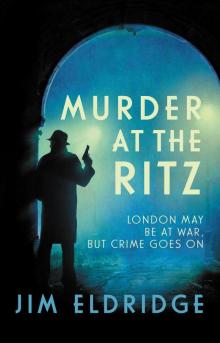 Murder at the Ritz
Murder at the Ritz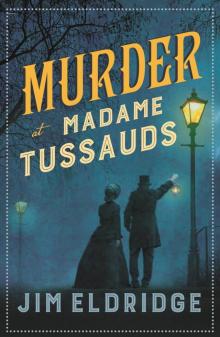 Murder at Madame Tussauds
Murder at Madame Tussauds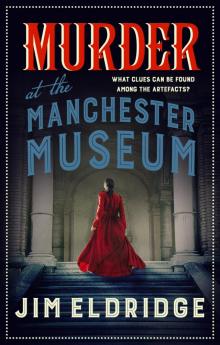 Murder at the Manchester Museum
Murder at the Manchester Museum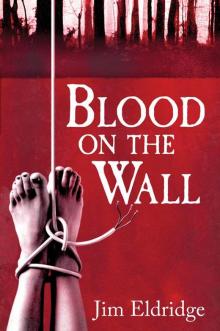 Blood On the Wall
Blood On the Wall 4.3.2.1
4.3.2.1 Jungle Kill (Black Ops)
Jungle Kill (Black Ops)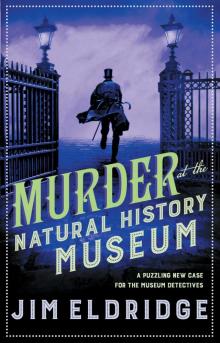 Murder at the Natural History Museum
Murder at the Natural History Museum Murder at the British Museum
Murder at the British Museum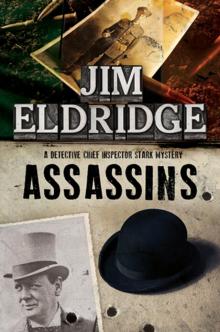 Assassins
Assassins Hunk and Thud
Hunk and Thud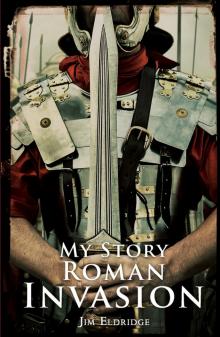 Roman Invasion
Roman Invasion Big Rock and the Masked Avenger
Big Rock and the Masked Avenger The Last Enemy
The Last Enemy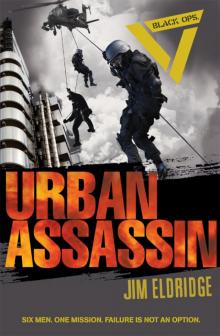 Urban Assassin
Urban Assassin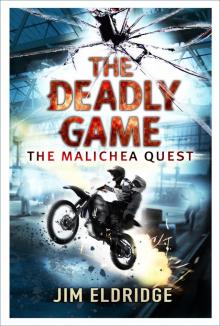 The Deadly Game
The Deadly Game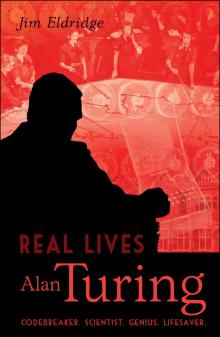 Alan Turing
Alan Turing The Lethal Target
The Lethal Target The Giant Rumble
The Giant Rumble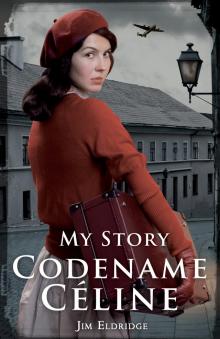 Codename Céline
Codename Céline Death in the Desert
Death in the Desert Escape from Pompeii
Escape from Pompeii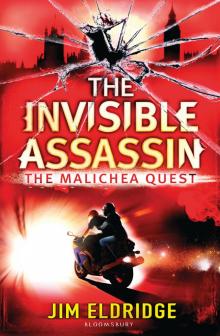 The Invisible Assassin
The Invisible Assassin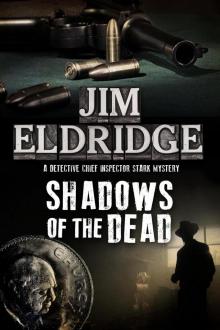 Shadows of the Dead
Shadows of the Dead Jack Versus Veto
Jack Versus Veto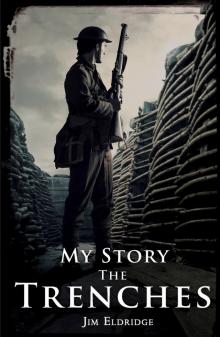 The Trenches
The Trenches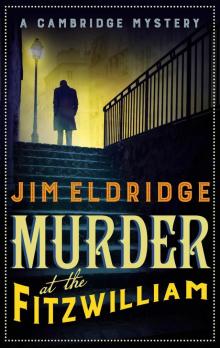 Murder at the Fitzwilliam
Murder at the Fitzwilliam Coming Home
Coming Home